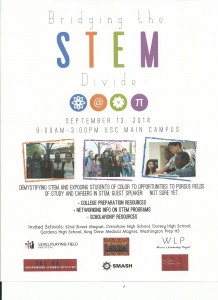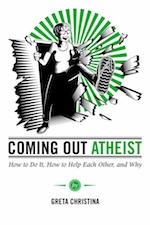Greta Christina’s timely, insightful new
book Coming Out Atheist: How to Do It, How to Help Each Other, and Why? dropped a few days ago! Black Skeptics interviewed her on the intersectional issues she addresses in the book, including the Atheism Plus phenomenon, feminism and social justice:
BS: In the book you stress the value of engaging in debates about religion with believers to encourage questioning and coming out. However, as you acknowledge, debating the validity of religious belief is only one part of the equation. For example, the vast majority of LGBTQ people of color and straight people of color are faith-aligned/identified precisely because mainstream America is racially segregated, faith (for many) is a form of cultural “home space” and social welfare resources in communities of color are extremely impacted. What further “intersectional” steps need to be taken to promote humanistic communities beyond just “coming out”?
GC: I’m surprised to hear you say that — I don’t think I did stress the value of debating with believers all that much. I mention in the book, but I don’t give it much space, and I mostly mention it because I actually advise against having those debates while you’re in process of coming out to people. I think that’s the wrong time for those debates. It is true that I think debating believers can be useful and valuable: a lot of atheists rag on other atheists for getting into those debates, insisting that they never work and are always a waste of time, so I think they deserve defending. And it can be difficult to draw a clear line between simply explaining your atheism, and explaining why you think religion is bunk. That’s one of the main reasons I talk about the topic at all. But it’s certainly not something I think everyone should do, I don’t think it’s a moral imperative or anything, and I think lots of other forms of activism are valuable.
So, with that being cleared up. The answer to your main question: Yes, for lots of people of color, faith is a home: it’s where people get social services, social support, a sense of identity and continuity and stability and history, and more. (It does seem that it can be a toxic home — that’s one of the takeaways I got from Candace Gorham’s book, “The Ebony Exodus Project,” I kept being struck throughout the book by how so many black women found their churches unsupportive and actually undermining. But it’s still a home.) So one of the biggest intersectional steps that godless communities can take is to make atheism a safer place to land for these folks. We need to look at what people of color are getting from their faith communities, and do more in our own communities to provide it. It wouldn’t suck if we did more to make some of these needs less necessary while we’re at it: to do political work on poverty and safety nets and institutional racism and so on. And no, that’s not “mission drift”: if local atheist communities can do blood drives and roadside cleanups and so on, there’s no reason they can’t do this sort of political work, too. And we need to be willing to take a hard look at the ways that we actually make our spaces unwelcoming: not just with racism of omission (e.g., failing to recognize what these folks need and provide it), but with more overt racism of commission. And all this actually does go back to the question of debates about religion: there’s not much point — strategically, poltically, or indeed morally — in arguing people out of religion if we don’t provide them a safe place to land if we succeed.
BS: What are your thoughts on “Atheism Plus”? Is it more than an online phenomenon and if so what concrete inroads are its proponents making in social justice organizing and coalition building?
GC: It depends somewhat on what you mean by “Atheism Plus.” If you mean specifically the online community that was founded a couple of years ago, I’m not actually that involved with it right now (not for any particular reason, I’ve just been focusing on other things), and I’m not the best person to ask about it. But the term “Atheism Plus” often gets used to refer to anyone (well, any atheist) who wants organized atheism to work more on social justice stuff: anyone who thinks organized atheism needs to work on making our communities more diverse and more welcoming to a wider variety of people, and anyone who thinks we need to work more on issues where secularism intersects with other social justice issues (like reproductive rights, megachurches and religious frauds preying on impoverished neighborhoods, ways that voucher funding of religious schools is undermining public education, skepticism applied to economic policies and police procedures and the drug war, etc.). And the term gets applied to anyone who thinks we need to be willing to clean our own house around this stuff: to pay attention to our own racism, sexism, classism, etc., and to work to get better around it.
If you mean that, I think we have had some success, although we sure as hell need more. When I travel around the U.S. to speak to local communities and student groups, I’m seeing a lot more diversity in the memberships and leaderships, a greater consciousness about these issues, a greater committment to taking action on them and more effectiveness in that action, than I did even just a few years ago. That’s especially true in the student groups. Whenever I get disheartened by racist/ sexist/ classist/ transphobic/ etc. bullshit in organized atheism, I try to remember that the student groups are way better about it than their elders are. When I talk about diversity with student groups, they’re almost always already on board — they don’t need to talk about “Why?”, they just want to talk about “How?” I’m not sure I’d credit that to Atheism Plus specifically, though — it’s more that this has been on a lot of people’s radar for a while, as has the pushback against it, and the genesis of Atheism Plus was a flash point for that.
GC: In the book you note that there has been an uptick in the numbers of African American participants in atheist/humanist conferences, however there is still no emphasis on social and racial justice issues by the majority of the leading atheist/humanist organizations. What can “white allies” do to help the leadership of these organizations get out of their church/state separation bubble?
You tell me. What would you like white allies to do? Seriously. I get asked questions like this a lot, and I try to answer as best I can (and I’ll try to answer you), but if you think there’s specific stuff we’re not doing that would be useful, I for one would like to hear it.
So, to answer your question as best I can. Some things I think white allies can do to shift the leadership: Speak up. Keep this stuff on our leaders’ radar. Give our leaders shit when they fail; make it clear that this is a priority for us. Give financial and other support to organizations that are doing a better job of it. Withdraw financial and other support from organizations that are seriously and consistently screwing it up. Give strokes when people get it right. Support up-and-coming leaders who are better on this stuff, and let organizations know which up-and-coming leaders we support and would like to see move up in the ranks. Give financial and other support to organizations that are specifically dedicated to this intersectional stuff (like Black Skeptics, to pick just one example completely at random).
And I think it might be useful to frame some of these other social justice issues as church/state separation issues. Attacks on abortion rights and access, religiously-inspired bullying of LGBTQ kids and teenagers, defunding of public schools for voucher funding of religious schools, abstinence-only sex education — these are church/state separation issues. We need to make that clearer. I keep hearing these fears about mission drift, fears that organized atheism is somehow going to drift into areas that have nothing whatsoever to do with religion or secularism. But nothing I’ve seen advocated by the social justice crowd looks like mission drift to me. It’s all in the wheelhouse of atheism, humanism, skepticism, secularism, and making safe homes for a wider variety of non-believers. It’s not like we’re trying to get funding for model railroad societies or something.
BS: In the book you use the phrase “women and people of color” often, however white women have a privileged position and power base in American society relative to women of color. In the atheist and humanist movements this has been reflected in the emphasis on sexual harassment, sexist language and sexist discrimination without a corresponding emphasis on the specific ways queer and straight women of color are marginalized, criminalized and shut out of leadership positions. Do you see the need for more feminist humanist dialogue across the racial/class divide?
GC: Absolutely.
I’m certainly not going to harsh on anyone for fighting against sexual harassment and assault in godless communities, and against online harassment and abuse and threats against feminists in the godless communities, and other major firestorm issues. I think this stuff is important, and I don’t think social justice is a zero sum game. But just as atheism in general needs to focus more on the needs of atheists who aren’t white, feminists within atheism need to focus more on the needs of atheist women who aren’t white.
Generally, I do like to see this framed, not so much as “Why are you focusing on (X)?,” but as “Why aren’t you also focusing on (Y)?” I think when people are volunteering time and energy and money on something they’re passionate about, and they get ragged on for doing it because we’d rather see them do something different, it tends to just be demoralizing. As a writer, this is one of the many thousands of bees in my bonnet: I write about stuff I care about, and I hate it when people say, “Why are you writing about atheism and feminism and fashion and sex when people are dying in Darfur?” And if we get too deeply into the “my issues are more important than yours” thing, I think it eventually takes us down a rabbit hole, where we’re going, “No! We have to work on slave labor in China! Female genital mutilation! The AIDS pandemic in Africa! State-sponsored torture!” Pretty much no matter what issue we’re working on, a case could be made that some other issue is more important. (In my opinion, if we seriously evaluated the ultimate value of different political issues, then every single political activist should stop everything we’re doing right now and work nonstop on global climate change — if we don’t fix that, then game over, end of civilization, nothing else any of us are doing will matter.) I think, ultimately, people need to do whatever activism gets them excited, and I don’t like trying to talk them out of that excitement by telling them that the thing they’re excited about is trivial. But I do think we can work to get people get excited about different kinds of activism than the ones they’re currently engaged in — including activism about race and class. And I think we can get people excited about the ways that the activism they’re already doing intersects with the activism we’re trying to get them to care about. That certainly happened with me: I wasn’t focusing nearly as much on this stuff until the last few years. And it’s happening with a lot of other writers and activists.
BS: What impact would you like your book to have within the “activist” atheist community?
GC: Is this a trick question? 🙂
The main impact I want the book to have is the obvious one — I want more atheists to come out to more people, and I want for that coming out process to go better for more people, with better results. I think coming out makes atheists’ own lives better: when I was researching the book and reading the hundreds of coming-out stories for it, I was struck by how overwhelmingly positive people are about it. Even if they had a hard time at first with their families and communities, it usually turned out mostly well over time; they often had less of a hard time than they’d thought they would; they often found other closeted atheists among their friends and family who they had no idea about; and even the ones who did end up alienated by the people they care about still think coming out was the right decision, and are still happy they did it. And all of that was true across color lines, gender lines, class lines. Of the hundreds of coming-out stories I read, literally just one person said they regretted having done it.
I think coming out makes atheists’ own lives better — and I think it makes things better for other atheists. The more we come out, the less alone other atheists will feel, the less stigmatized atheism will be, and the less strong a hold religion will have. Coming out makes it easier for other atheists to come out — and it makes things easier on other atheists who really don’t think they can come out safely right now. And of course, coming out is how we organize. It is a hugely powerful political act: that’s been true for LGBTQ people, and it’s true for us. Of course I recognize that it’s harder for some people than others — for reasons of race and ethnicity, economic class, culture, gender, geography, as well as simply for reasons of personality and people’s personal situations. I certainly don’t encourage anyone to come out if it’s going to seriously screw up their lives. But I want every atheist who wants to come out to be able to do it — and I wrote this book to help make that happen. I want to help atheists come out. I want other atheist activists to help atheists come out — and to give them a safer place to land when they do. I’m hoping that this book makes that work easier. I think that it will.






